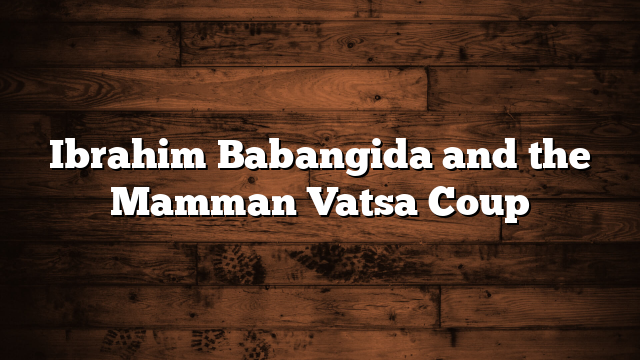Major General Mamman Jiya Vatsa was a highly decorated officer in the Nigerian Army, with a distinguished career that spanned several decades. He was a close friend and ally of General Ibrahim Babangida, who had assumed power in a military coup in 1985. However, despite their close relationship, Vatsa was accused of plotting a coup against Babangida’s government, along with nine other military officers.
The exact details of the alleged coup plot remain shrouded in secrecy to this day. Some have suggested that the officers were planning to overthrow Babangida’s government and install Vatsa as the new military ruler. Others have speculated that the coup was part of a broader power struggle within the military, with different factions jockeying for control.
On the 23rd December, 1985, Vatsa was in his study late into the night when he received a telephone call from the Military President, General Ibrahim Babangida, inviting him to Dodan Barracks. He was the Minister of the Federal Capital Terrority and a member of the Armed Force Ruling Council (AFRC). He put a call to his wife, Yufiya, who was in the sitting room watching a programme on television, telling her that Babangida had invited him to Dodan Barracks.
The wife protested, telling her husband that it was too late in the night to go to Dodan Barracks. They were still arguing on whether to go to Dodan Barracks that night or not when Lt. Colonel U.K. Bello led a squad of soldiers into Vatsa’s residence on Rumens Street at Ikoyi, Lagos. The military men came in armourd cars and military vehicles. At that point, it was clear to Vatsa and wife that it was no longer a courtesy invitation, but an arrest. Vatsa could see that his residence had been surrounded by soldiers.
At the point of leaving his home, he beckoned to his wife, gave her a bear hug, kissed her and also kissed his first son, who was a student at a Military College in Kaduna. The military contingent drove out of Rumens Street, Eekoyi, Vatsa’s residence with the Major General as a captive and, of course, a prisoner. He left his Ikoyi residence never to return to it. Against him was an allegation of treason and coup financing. Vatsa was even fingered to be the leader of the coup.
Whatever the true nature of the coup plot may have been, it was allegedly uncovered by the government’s security forces, and Vatsa and his co-conspirators were arrested and put on trial. The trial was widely criticized for its lack of due process and transparency, with many alleging that the accused officers were denied access to legal representation and subjected to torture and other forms of mistreatment.
Despite these concerns, Vatsa and the other officers were found guilty and sentenced to death.
On March 5th, 1986, they were executed by firing squad in Laygos. The execution sent shockwaves through the Nigerian military and the broader society, with many questioning the legitimacy of Babangida’s government and its commitment to democracy and human rights.
Over the years, there have been numerous attempts to revisit the case and shed light on what really happened. Some have called for the government to formally apologize for the execution and provide compensation to the families of the deceased. Others have urged a full investigation into the coup plot and the conduct of the trial, with the hope of uncovering new evidence and establishing a more accurate historical record.

